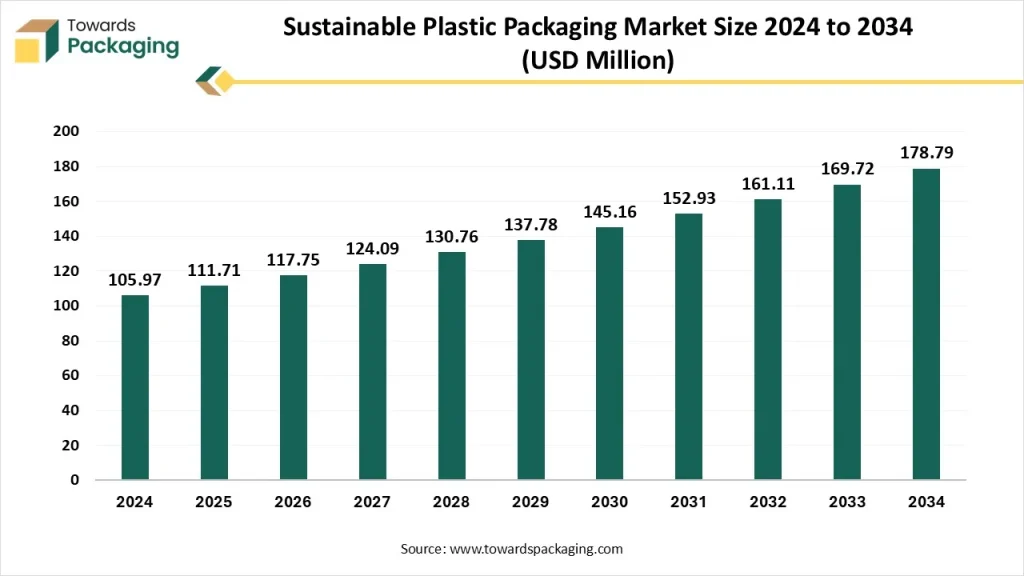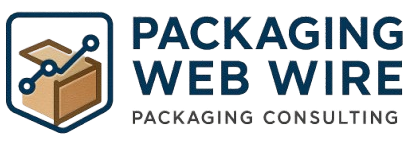The sustainable plastic packaging market is on a steady growth trajectory, projected to increase from USD 111.71 million in 2025 to USD 178.79 million by 2034. This growth is driven by a CAGR of 5.43%, largely fueled by increasing environmental awareness and the push for more sustainable product packaging across industries.

Regional Market Highlights
Asia Pacific Leads Today
In 2024, the Asia Pacific region took the lead in market share, benefiting from strong manufacturing capabilities and advancements in production and packaging technologies.
Invest in Our Premium Strategic Solution: https://www.towardspackaging.com/download-databook/5617
North America on the Rise
Looking ahead to 2025–2034, North America is expected to grow at the fastest pace, thanks to supportive regulations, evolving consumer preferences, and increased investments in sustainable packaging infrastructure.
Key Material Insights
Why Polyethylene (PE) Leads
In 2024, polyethylene (PE) emerged as the most dominant material due to its durability and strength—particularly important in the growing e-commerce sector, where safe and secure delivery is a priority.
The Rapid Growth of Bioplastics
Bioplastics are poised to expand the fastest during the forecast period. These eco-friendly materials decompose naturally and are gaining popularity across a wide range of applications, from food packaging to medical products.
Get All the Details in Our Solutions – Access Report Preview: https://www.towardspackaging.com/download-sample/5617
Packaging Types: Flexible vs. Rigid
Flexible Packaging in the Lead
Flexible packaging dominated in 2024 due to its efficiency—requiring less material and generating less waste. Products like wraps, films, and pouches help reduce the carbon footprint while maintaining product integrity.
Rigid Packaging Gaining Momentum
Rigid plastic packaging is expected to grow quickly thanks to its durability, lower transportation cost, and suitability for high-pressure environments. It’s especially favored in the healthcare and consumer goods sectors.
Packaging Format Insights
Why Primary Packaging Dominated
Primary packaging, which directly encloses the product, held the largest share in 2024. It plays a crucial role in keeping food and healthcare products fresh and uncontaminated. Sustainable materials like plant-based polymers and recycled plastics are becoming the norm.
Secondary Packaging’s Fast Growth
Secondary packaging, used to protect products during transport and storage, is expected to grow rapidly. Its role in maintaining product quality across supply chains is becoming more vital than ever.
Biodegradable vs. Recyclable Processes
Biodegradable Packaging Takes the Lead
In 2024, biodegradable processes led the way. Packaging made from natural sources such as corn or sugarcane appealed to eco-conscious consumers due to their ability to break down safely.
Growth in Recyclable Packaging
The recyclable process segment is expected to grow significantly through 2034. It supports efforts to cut down landfill waste and reduces the environmental footprint of single-use plastics.
If you have any questions, please feel free to contact us at sales@towardspackaging.com
Application Insights
Food and Beverage Segment Remains Strong
This sector dominated in 2024, thanks to increased responsibility in adopting eco-friendly packaging. Brands are investing in materials like PET and HDPE to meet both environmental goals and consumer expectations.
Healthcare Segment to Expand Quickly
From 2025 onward, the healthcare industry is projected to see rapid growth in sustainable packaging. Strong, inert packaging is essential for drug safety and storage, making sustainable options increasingly attractive.
Emerging Trends Shaping the Industry
Bioplastics Gain Popularity
Used in a wide array of products from disposable utensils to medical devices and automotive insulation, bioplastics are reducing reliance on fossil fuels and lowering environmental impact.
Focus on Primary Packaging
Primary packaging is increasingly designed with sustainability in mind. Brands are shifting to recyclable and biodegradable materials to meet consumer demand and reduce pollution.
Rising Demand for Affordable Eco-friendly Solutions
Small and mid-sized businesses are driving demand for cost-effective yet sustainable packaging. The goal is to maintain product safety without raising costs or environmental harm.
How AI is Transforming the Packaging Industry
AI is becoming a powerful ally in the sustainable plastic packaging space. It enhances efficiency by:
-
Designing packaging with minimal material use
-
Improving recyclability through smarter material sorting
-
Forecasting demand to avoid overproduction and waste
These innovations help manufacturers stay ahead in a market that increasingly values sustainability.
Market Drivers, Challenges, and Opportunities
Driver: Push for Biodegradable Innovation
As governments and consumers demand more sustainable options, businesses are investing in biodegradable materials that meet functional needs while decomposing safely. This marks a significant shift away from single-use plastics.
Restraint: Lack of Recycling Infrastructure
Many regions still lack the facilities needed to process biodegradable and compostable plastics. This limits the growth of the market and makes end-of-life product management more complex.
Opportunity: Consumer Awareness
Ongoing government campaigns and education efforts have increased public interest in green packaging. Consumers are willing to pay more for eco-conscious products, pushing companies to rework their strategies.
Recent Developments in the Market
Company Announcements
In May 2025, Clemens Stockreiter, Founder of RE: CIRCLE Solutions, announced the launch of “Oroflex” by Oroville Flexible Packaging, a flexible and recyclable plastics solution aimed at U.S. retailers and public institutions.
Product Innovations
In March 2025, Mars, in collaboration with Berry Global, unveiled 100% recycled plastic jars for popular products like M&M’s, Skittles, and Starburst—demonstrating a strong shift toward circular packaging practices.
Final Thoughts
The future of sustainable plastic packaging is bright. With steady growth, ongoing innovations, and increasing public and regulatory support, the market is becoming a critical part of the global push toward a greener economy. Brands that embrace biodegradable, recyclable, and AI-enhanced packaging strategies will lead this transformation over the next decade.
Source : https://www.towardspackaging.com/insights/sustainable-plastic-packaging-market-sizing

